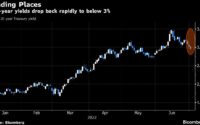Flooding, war, and a looming global recession: The economic pressure keeps building and one wrong move could send things tumbling
A revolving door at No. 10 Downing Street, war in Ukraine, the big risk of a recession in the world’s biggest economy, inflation and floods.
It’s enough to give you that sinking feeling.
Treasurers the world over have an enormous weight of responsibility right now, because an overriding problem for everyone is that many of us are struggling to make ends meet.
That includes governments.
On Tuesday Treasurer Jim Chalmers will deliver the new government’s first budget.
It’ll be a “responsible” one, he says.
Ahead of that, though, he has some urgent business: setting aside $3 billion to mainly help flood-affected Australian households get back on their feet.
“The primary focus when it comes to cash payments will be Australians in the flood-affected communities themselves … that’s our first priority,” he says.
“There will be broader cost of living relief in the budget as well, but we need to be very, very careful that any cost of living relief that we provide in the budget doesn’t push up inflation further when Australians are already under the pump.”
There’s an interesting phrase in that last sentence: “very, very careful”.
You see inflation has gripped the globe, tightening like a boa constrictor.
Make the wrong move and it’ll be the end of you, as former British prime minister Liz Truss found.
But it’s also a mistake to think that you can control inflation with all the right policy moves.
Take the floods
Floods, for example, can wipe out a season’s crops in a matter of hours — stalling supply chains and increasing prices.
It’s impossible to estimate the inflationary impact of the current floods, but the Treasury’s had a stab at it.
The treasurer says widespread flooding across the east coast will force inflation for fruit and vegetables above 8 per cent for the next six months and will hit the nation’s economic growth by 0.25 per cent in the December quarter.
Some of Australia’s most productive agricultural land has been inundated by floodwaters across New South Wales, Victoria and Tasmania.
Inflation was already forecast to hit 7.75 per cent by the end of the year.
That seems like a conservative estimate now.
But what’s a treasurer to do? He can’t “spray” money around, as he says, because that will further propel sky-rocketing inflation.
At the same time, millions of Australians desperately need more financial assistance.
The Australian Council of Social Service says, for example, more Australians could have better access to mental health treatment, children could be lifted out of poverty and aged care homes could be properly staffed if the government had more money at its disposal.
Flood victims have now filed into that queue — and their pain is particularly acute, especially as many of them will be homeowners and another cost pressure is heading their way.
Interest rates still rising
Let’s be honest, the second most aggressive monetary tightening cycle in the Reserve Bank’s history is scary.
Mortgage borrowers need to find the cash for extra monthly repayments and renters dread “that letter” from their landlord.
But the rate rises are necessary, or so we’re led to believe by just about every economist and the Reserve Bank.
The pace of rate rises though is slowing.
This week’s unemployment rate — unchanged at 3.5 per cent — showed more Australians lost jobs than gained them and indicates that the economy is vulnerable to slowing.
“The jobs market remains tight but looks to be starting to cool,” AMP chief economist Shane Oliver says.
“Unemployment may still fall a bit further, but through next year its likely to rise above 4 per cent as the reopening surge in jobs is behind us, rate hikes will hit demand and foreign workers and immigrants are returning rapidly, which will add to labour supply.”
The last thing the treasurer wants to do is stimulate the economy.
Yes, it may boost growth but the economy is operating at close to “capacity” right now — so if you nudge it any further, something could break.
Rubbing salt into the wound
That’s why cost-push inflation, which is what the floods are generating, is so difficult to absorb right now.
A further inflation hit is coming, and interest rates will continue to rise, but the higher cost of living is not driven by increased demand in the economy.
Do you see where this is heading? We run the risk of higher unemployment, rising inflation, increased interest rates, and lower economic growth.
China’s robust economic growth helped the Australian economy significantly during both the global financial crisis and the pandemic recession.
How’s China’s economy doing now? We don’t actually know.
China has delayed the release of its latest economic growth figures.
They were due to be published as the Communist Party’s leadership gathers, but a new date for the release of the figures is yet to be scheduled.
The treasurer now wants to avoid pushing the budget further into the red, provide funds to those who need it most and, in the process, avoid creating more inflation.
He also must support economic growth knowing wage growth remains stagnant and household saving buffers fall further with each month.
All this with a backdrop of a looming global economic recession.
Yeah, that’ll give you a sinking feeling alright.
Loading form…
[ad_2]
Source link


